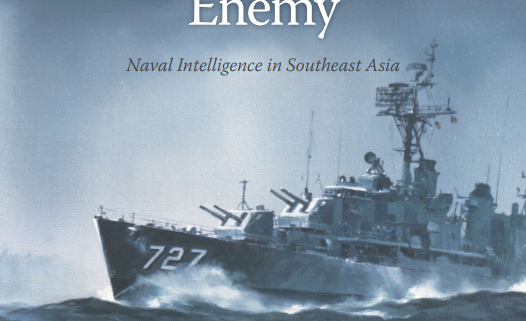7 Recommendation Books About Vietnam War
Introduction: The Enduring Significance of the Vietnam War and the Value of Recent Scholarship Recommendation Books About Vietnam War – The Vietnam War (roughly 1955-1975) remains one of the most heavily studied, debated, and emotionally charged conflicts in modern history. For the United States, its involvement from the early 1960s to 1973, and its eventual outcome, marked a significant turning point, challenging national identity, reshaping foreign policy, and leaving a lasting impact on its veterans and society.
.
But the war was far more than just an “American War”; it was a brutal, long-fought struggle for independence and reunification in Vietnam, a proxy battleground for the global Cold War involving major powers like the Soviet Union and China, and a conflict with profound consequences for Southeast Asia.Understanding the Vietnam War is crucial for grasping the dynamics of the Cold War, the challenges of interventionism, the complexities of irregular warfare, and the powerful influence of public opinion and media on conflict..
.It is a conflict that continues to resonate in geopolitical strategies, military doctrine, and cultural memory across the globe. Given its multifaceted nature and the diverse perspectives involved—from high-level policymakers and military strategists to ground-level soldiers, anti-war activists, and the Vietnamese people who lived through the devastation—no single book can provide a complete picture. However, by engaging with a range of different accounts, we can build a more nuanced and comprehensive understanding.While foundational works on the Vietnam War were published decades ago, scholarship and historical analysis continue to evolve..
.
The period from 2015 to the present (April 2025) has seen the publication of significant new books that offer fresh perspectives, utilize newly available sources, revisit key events with the benefit of hindsight, and explore aspects of the war that may have been less emphasized in earlier narratives. These recent publications reflect ongoing historical inquiry, new research methodologies, and a continued effort to grapple with the war’s complex legacy. This guide highlights 10 essential books published within this recent timeframe, offering diverse insights into the history, experiences, and continuing impact of the Vietnam War. These selections represent a mix of comprehensive histories, focused studies on specific aspects, and analyses of the war’s memory and consequences.
7 Recommendation Books About Vietnam War
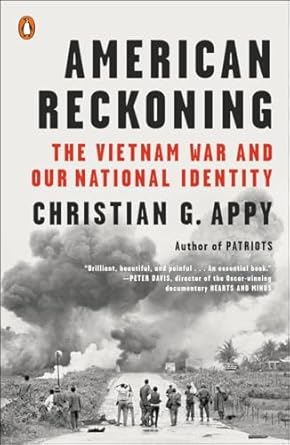
1. American Reckoning: The Vietnam War and Our National Identity
Author: Christian G. Appy
Why This Book is Essential Reading:
Christian Appy is a renowned historian of the Vietnam War, and in this powerful book, he argues compellingly that the war fundamentally challenged and reshaped American identity and self-perception. Moving beyond a simple history of events, Appy delves into how the experience of the Vietnam War forced Americans to confront uncomfortable truths about their nation’s power, morality, and place in the world. He examines how the war eroded public trust in government and institutions, fueled social and political divisions, and continues to influence how Americans understand their history and their role in international affairs. This book is essential for understanding the deep and lasting domestic impact of the war on American society and its collective consciousness.
Synopsis and Analysis of Significance:
American Reckoning provides a sweeping analysis of the Vietnam War’s impact on the United States, from the optimistic assumptions that led to intervention to the deep cynicism and division that followed the conflict’s end. Appy synthesizes a vast array of sources, including popular culture, political rhetoric, and personal testimonies, to trace how the initial belief in American exceptionalism and the nation’s benevolent global mission was severely tested and ultimately fractured by the realities of the war. He explores how the discrepancy between the stated goals of the war and the often brutal means employed, coupled with the eventual lack of victory, created a crisis of confidence within the United States. The book argues that the war exposed fundamental flaws in American foreign policy thinking and had a corrosive effect on domestic politics, contributing to phenomena like the rise of political polarization and skepticism towards government authority.
Appy structures his argument thematically, exploring topics such as the mythology surrounding the war, the experiences of soldiers, the anti-war movement, the political maneuvering in Washington, and the struggle to come to terms with the war’s legacy in the decades since. He contends that the “reckoning” is an ongoing process, as Americans continue to grapple with the difficult questions raised by the conflict. The book is written in accessible prose despite its academic depth, making it suitable for a wide readership. Its significance lies in its focus on the war’s internal consequences for America, arguing that Vietnam remains a crucial lens through which to understand contemporary American political and social dynamics. For anyone interested in the cultural, political, and psychological impact of the war on the United States, rather than just the military history, Appy’s book offers profound insights and a challenging perspective published relatively recently, allowing it to incorporate later analysis and reflection.
The book’s strength is in its ability to connect the specific events and experiences of the Vietnam War to broader themes of national identity and historical memory. Appy doesn’t just recount history; he analyzes how that history has been remembered, interpreted, and utilized in American public discourse. By examining everything from movies and memorials to political speeches and historical narratives, he reveals how the war continues to shape debates about power, intervention, and American values. This makes American Reckoning a vital contribution to the ongoing conversation about the Vietnam War and its place in the American story, particularly relevant in the context of recent discussions about military intervention and national purpose.
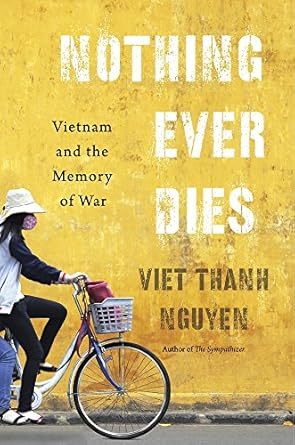
2. Nothing Ever Dies: Vietnam and the Memory of War
Author: Viet Thanh Nguyen
Why This Book is Essential Reading:
Written by the Pulitzer Prize-winning author of the novel The Sympathizer, this book offers a deeply personal and intellectual exploration of how the Vietnam War is remembered—or misremembered—by different countries and cultures, particularly Vietnam and the United States. Nguyen, who came to the U.S. as a Vietnamese refugee, provides a crucial transnational perspective on the war and its legacy, focusing on memory, representation, and the “ethics of remembering.” It is essential for understanding that the war’s meaning is contested and continues to live on in complex ways.
Synopsis and Analysis of Significance:
Nothing Ever Dies is not a history of the Vietnam War in the traditional sense, but rather a critical examination of the war’s afterlife in memory, culture, and politics across various nations, with a primary focus on Vietnam and the United States. Viet Thanh Nguyen argues that while the fighting ended in 1975, the war continues to exist in how it is remembered, commemorated, and represented in literature, film, museums, and public discourse. He explores the differing narratives constructed by the victors (the unified Vietnam) and the losers (primarily the United States and the defeated South Vietnamese). Nguyen highlights how the “official” memories often suppress or distort the experiences of marginalized groups, such as refugees, defectors, and civilians caught in the crossfire.
The book delves into how memories of the war are commodified, politicized, and used to justify later actions. Nguyen critically analyzes American cultural productions about the war, such as Hollywood films, arguing that they often center the American experience while marginalizing or dehumanizing the Vietnamese. He contrasts this with how the war is remembered in Vietnam, where official narratives emphasize heroic struggle and national liberation, sometimes at the expense of acknowledging the suffering and divisions caused by the conflict. Nguyen also reflects on the memory of the war among the Vietnamese diaspora, particularly in the United States, who often hold a distinct and sometimes conflicting set of memories compared to those in Vietnam or the mainstream American narrative.
Nguyen’s prose is insightful, challenging, and deeply empathetic. He draws on his own experiences as a refugee and his extensive knowledge of literature and critical theory to offer a nuanced analysis of how war memory is constructed, contested, and transmitted across generations. The book’s title, “Nothing Ever Dies,” underscores his argument that the war’s effects persist not just in physical landscapes and unexploded ordnance, but fundamentally in the realm of memory and representation. Its significance lies in offering a vital transnational and critical perspective that pushes beyond nationalistic or singular interpretations of the war, insisting on the importance of recognizing the diverse and often conflicting memories held by those on all sides of the conflict. For anyone interested in the lasting cultural and psychological impact of the war, and the politics of historical memory, Nguyen’s book is a profound and necessary read published in the last decade, offering a timely reflection.
By focusing on memory, Nguyen shows how the war continues to shape contemporary identities and international relations. He challenges readers to think about whose memories are privileged and whose are silenced, and what the ethical responsibilities are when remembering a conflict that caused so much trauma and loss across multiple nations. His work is particularly relevant in an era where historical narratives are frequently debated and contested. Nothing Ever Dies provides a compelling framework for understanding how the past continues to live on in the present, making it a crucial contribution to understanding the enduring legacy of the Vietnam War from a perspective that gives voice to experiences often overlooked in Western accounts.
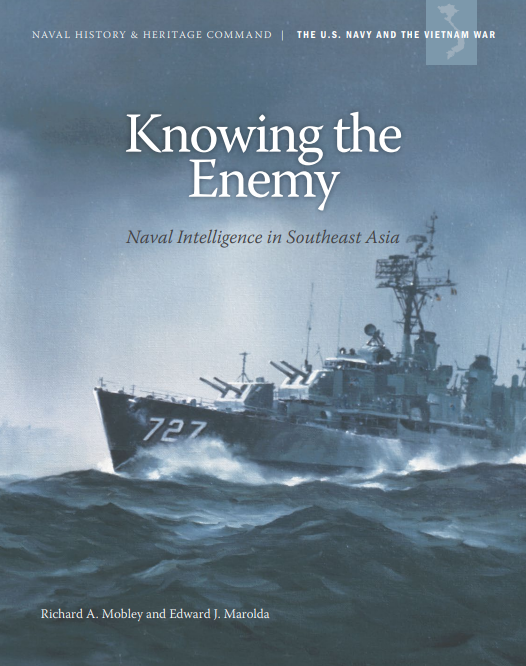
3. Knowing the Enemy: The American Organization and Production of Intelligence on the Viet Cong and North Vietnamese, 1962-1975
Author: John A. Gartner
Why This Book is Essential Reading:
This book offers a focused yet crucial examination of a key aspect of the U.S. involvement in Vietnam: the intelligence effort aimed at understanding the enemy forces, the Viet Cong and the North Vietnamese Army (NVA). John Gartner delves into how American intelligence agencies and military commands collected, analyzed, and disseminated information about the opposing forces, and critically, how successful (or unsuccessful) they were in accurately assessing the enemy’s strength, strategy, and intentions. Understanding the intelligence dimension is vital for comprehending the strategic failures and misunderstandings that plagued the American war effort.
Synopsis and Analysis of Significance:
Knowing the Enemy is a detailed historical study that goes deep into the archives to analyze the complex and often flawed intelligence operations conducted by the United States and its allies during the Vietnam War. Gartner examines the various intelligence agencies involved, including the CIA, military intelligence branches, and the controversial Phoenix Program, and explores their methods for gathering information, from signals intelligence and aerial reconnaissance to prisoner interrogations and defectors’ reports. The core of the book’s analysis lies in assessing how this raw information was processed, analyzed, and ultimately used (or ignored) by policymakers and military commanders in Saigon and Washington.
The book highlights significant challenges faced by the intelligence community, including inter-agency rivalries, bureaucratic inertia, cultural and linguistic barriers, and the inherent difficulty of accurately assessing a largely decentralized insurgency (the Viet Cong) and a highly disciplined regular army (the NVA) operating in complex terrain and often enjoying local support. Gartner delves into specific instances where intelligence assessments were debated, challenged, or potentially manipulated to fit pre-existing assumptions or political objectives, such as the controversies surrounding the Order of Battle estimates of enemy strength, particularly before and after the 1968 Tet Offensive.
Gartner argues that while a vast amount of intelligence was collected, significant failures occurred in analysis, interpretation, and its effective integration into strategic planning and tactical operations. The book demonstrates how a failure to truly “know the enemy” – to understand their motivations, resilience, political goals, and relationship with the population – contributed directly to the miscalculations and strategic dead ends of the U.S. war effort. The significance of this book, published in 2016, lies in its rigorous focus on a critical but often overlooked aspect of the war. It provides a sobering look at the limitations and complexities of intelligence gathering and analysis in the context of a counterinsurgency and conventional war hybrid. For readers interested in the operational and strategic ‘how and why’ of the war, particularly from a military and intelligence perspective, this book offers a valuable, recently researched deep dive.
By examining the intelligence war, Gartner sheds light on the information gaps and flawed assumptions that shaped decision-making at the highest levels. He shows how bureaucratic pressures and political imperatives could override objective analysis, leading to a distorted picture of the reality on the ground. This book is a powerful case study in the challenges of intelligence in warfare and its vital, yet often problematic, relationship with policy and command. Its recent publication allows it to incorporate findings from declassified documents and earlier scholarship, providing an up-to-date assessment of this critical dimension of the Vietnam War.

4. Hue 1968: A Turning Point of the American War in Vietnam
Author: Mark Bowden
Why This Book is Essential Reading:
Mark Bowden, the acclaimed author of Black Hawk Down, brings his masterful narrative skills to bear on one of the most pivotal and brutal battles of the Vietnam War: the Battle of Hue during the 1968 Tet Offensive. This book is essential for understanding the intensity of urban combat in Vietnam, the experience of soldiers on both sides, and the profound strategic and political impact of Tet, which fundamentally changed the American public’s perception of the war. Bowden’s ground-level perspective makes the history immediate and visceral.
Synopsis and Analysis of Significance:
Hue 1968 is a gripping, blow-by-blow account of the fighting for the ancient imperial city of Hue, one of the bloodiest and most prolonged engagements of the entire Vietnam War. During the surprise Tet Offensive launched by the Viet Cong and North Vietnamese Army in January 1968, Hue was captured by enemy forces and held for nearly a month against determined counterattacks by U.S. Marines, South Vietnamese Army (ARVN) troops, and other allied forces. Bowden meticulously reconstructs the battle using extensive interviews with veterans from all sides—American Marines and soldiers, ARVN troops, Viet Cong fighters, and North Vietnamese soldiers—as well as archival documents and historical records.
The narrative alternates between the perspectives of those fighting in the streets and buildings of Hue and the decision-makers in Saigon and Washington. Bowden reveals the initial confusion and underestimation of the enemy’s strength by the American command, the incredible difficulty and danger of urban warfare, and the immense courage and suffering of the soldiers involved. He doesn’t shy away from the brutality of the fighting, the heavy casualties on all sides, or the immense destruction inflicted upon the beautiful city and its civilian population. The book also covers the infamous massacre of thousands of Hue residents by the Viet Cong and NVA forces during their occupation of the city.
Bowden portrays the Battle of Hue as a microcosm of the larger war and a crucial turning point. While the U.S. and ARVN forces eventually retook the city at immense cost, the fact that the enemy could launch such a large-scale, coordinated offensive into the heart of South Vietnam, including its cultural capital, shocked the American public and undermined President Lyndon B. Johnson’s claims that the end of the war was in sight. The vivid and often grim reporting of the battle by journalists like Walter Cronkite contributed significantly to the growing anti-war sentiment in the United States. Published in 2017, Bowden’s account benefits from decades of historical perspective and the ability to interview participants who are now elderly. Its significance lies in providing an incredibly detailed, human-centered account of a single, crucial battle that had far-reaching consequences. For readers who want to understand the visceral reality of combat and the immediate impact of a key moment in the war, Hue 1968 is an essential and powerful read.
Bowden’s strength lies in his ability to weave together numerous individual stories into a coherent and compelling narrative tapestry. He brings the chaos and intensity of urban fighting to life, highlighting the bravery and terror experienced by soldiers on both sides. By incorporating Vietnamese perspectives, he provides a more complete picture of the battle than accounts relying solely on American sources. The book serves as a powerful reminder that behind strategic narratives are the lived experiences and profound suffering of individuals caught in the maelstrom of war. Its focus on Hue demonstrates how localized events could have massive national and international repercussions, solidifying its place as a major contribution to understanding the war, particularly its human cost and strategic turning points.
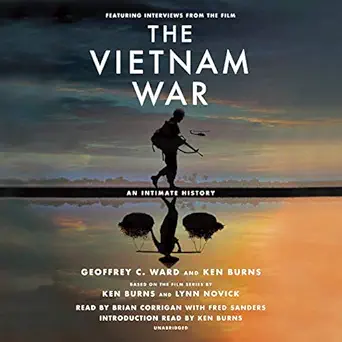
5. The Vietnam War: An Intimate History
Author: Geoffrey C. Ward & Ken Burns
Why This Book is Essential Reading:
This book serves as the companion volume to the widely acclaimed documentary series by Ken Burns and Lynn Novick. Like the series, it offers a comprehensive, narrative history of the entire conflict from multiple perspectives – American soldiers and policymakers, anti-war protestors, and crucially, Vietnamese individuals from both the North and the South. It is an excellent resource for readers seeking a broad, accessible, and multi-faceted overview of the war, benefiting from extensive research and a wide range of testimonial voices collected for the documentary project.
Synopsis and Analysis of Significance:
The Vietnam War: An Intimate History provides a sweeping chronological account of the conflict, tracing its origins in French colonialism and the First Indochina War, through the deepening American involvement, the major battles and political developments, the peace negotiations, and the final collapse of South Vietnam, extending into the war’s complex aftermath. While covering the key historical events, the book, like the documentary, places a strong emphasis on personal experiences. It weaves together excerpts from diaries, letters, oral histories, and interviews with people from all sides of the conflict: American veterans and their families, Vietnamese soldiers and civilians (both North and South), policymakers, diplomats, and anti-war activists. This approach provides an “intimate” view of the war, grounding the grand historical narrative in the lived realities of those who experienced it firsthand.
The book is richly illustrated with photographs from the Ken Burns/Lynn Novick archive, many of which are iconic images from the war. The narrative prose, primarily written by Geoffrey C. Ward, is clear, engaging, and designed to make the complex history accessible to a broad audience. While not delving into highly specialized academic debates, it provides a solid and well-researched overview that incorporates recent historical understanding and moves beyond purely American-centric narratives by including significant Vietnamese voices. The book covers key periods and themes, such as the advisory years, the escalation under LBJ, the Tet Offensive, the political turmoil in the U.S. and Vietnam, the Nixon years and “Vietnamization,” and the long-term consequences of the conflict.
Its significance lies in its accessibility and its commitment to presenting multiple perspectives. For readers who watched the documentary or are looking for a single volume that provides a comprehensive yet human-centered introduction to the entire span of the war, this book is an excellent choice published relatively recently in 2017. It serves as a valuable resource for getting a solid understanding of the main events, key players, and the diverse human experiences of the war, making the history feel personal and immediate. It reinforces the understanding that the Vietnam War was experienced in vastly different ways depending on one’s nationality, political allegiance, and role in the conflict, emphasizing the importance of listening to multiple voices when studying this complex period.
By serving as the literary companion to the influential documentary series, the book benefits from the extensive research and interviews conducted for that project. It allows readers to delve deeper into the historical narrative and the personal stories hinted at in the film. The inclusion of perspectives from Vietnamese combatants and civilians is particularly valuable, helping to provide a more balanced and international view of a conflict often presented in the West primarily through an American lens. This makes The Vietnam War: An Intimate History a significant recent contribution to the popular understanding of the war, promoting empathy and a broader historical consciousness.
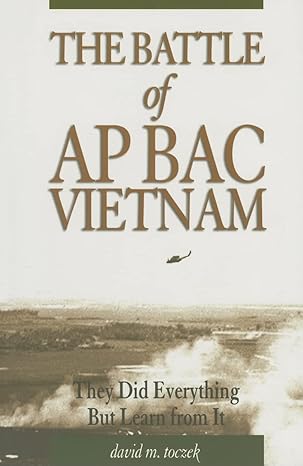
6. The Battle of Ap Bac: Lost Victory in the Mekong Delta
Author: David M. Toczek
Why This Book is Essential Reading:
While not as famous as the Tet Offensive or the battle for Hue, the Battle of Ap Bac in January 1963 was an early and crucial engagement in the Vietnam War that exposed significant flaws in the South Vietnamese military (ARVN) and the American advisory effort. David Toczek’s book offers a detailed, ground-level analysis of this specific battle, making it essential for understanding the early dynamics of the conflict, the challenges faced by U.S. advisors, and the effectiveness (or lack thereof) of the South Vietnamese forces. Focusing on this single battle provides deep insights into broader strategic and tactical issues.
Synopsis and Analysis of Significance:
The Battle of Ap Bac provides a meticulous historical reconstruction and analysis of a relatively small but highly consequential engagement that took place early in the American involvement in Vietnam. In this battle, a larger force of ARVN troops, supported by American advisors and airpower, failed to decisively defeat a smaller, entrenched force of Viet Cong guerrillas. Despite having superior numbers and technology, the ARVN units displayed poor leadership, coordination, and fighting spirit, resulting in heavy casualties and allowing the majority of the Viet Cong force to escape. The battle was a stark indicator that the South Vietnamese military was not adequately prepared to face the Viet Cong insurgency, despite years of American training and support.
David Toczek’s book delves into the planning, execution, and aftermath of the battle, drawing on historical records, after-action reports, and accounts from participants. He examines the decisions made by both the American advisors and the ARVN commanders, highlighting tactical errors, communication failures, and a fundamental lack of aggressive leadership on the South Vietnamese side. The battle became controversial because many American advisors present were highly critical of the ARVN’s performance, but their candid assessments were often downplayed or dismissed by higher levels of command seeking to present a more positive picture of the war’s progress. Journalists like Neil Sheehan (author of A Bright Shining Lie) reported extensively on Ap Bac, bringing attention to the ARVN’s shortcomings and challenging the official optimistic narrative.
Published in 2018, Toczek’s detailed analysis benefits from decades of historical research and reflection on the battle’s significance. He argues that Ap Bac exposed deep-seated problems within the ARVN regarding leadership, morale, and operational effectiveness, issues that would plague the South Vietnamese military throughout the war. It also highlighted a disconnect between the realities on the ground, as observed by frustrated U.S. advisors, and the more sanguine reports often favored by the American command. The significance of focusing on this battle lies in understanding that the problems in Vietnam were evident relatively early in the conflict, challenging the notion that things only went wrong much later during the large-scale U.S. troop deployments. For readers interested in the early history of the American involvement, the challenges of military advising, and the operational realities of the war at a micro level, Toczek’s detailed account of Ap Bac provides crucial insights based on recent scholarship.
By providing a granular look at this specific engagement, Toczek allows readers to see how strategic theories and policy decisions played out (or failed to play out) in the chaos of combat. The battle serves as a powerful case study of the difficulties in building an effective allied force and the challenges of counterinsurgency warfare. His detailed analysis contributes to a more nuanced understanding of the factors that contributed to the U.S. and ARVN’s struggles against a determined and well-led enemy, making this recent book a valuable addition to the literature on the operational history and early failures of the Vietnam War.

7. Agent Orange: History, Science, and the Politics of Uncertainty
Author: David Martino
Why This Book is Essential Reading:
The use of chemical defoliants, particularly Agent Orange, is one of the most controversial and devastating aspects of the Vietnam War, with ongoing health and environmental consequences for both Vietnamese people and American veterans. David Martino’s book provides a comprehensive and up-to-date examination of this critical issue, covering its history, the scientific debates surrounding its health effects, and the complex political struggles over recognition, compensation, and environmental remediation. It is essential for understanding a major, long-lasting human and environmental cost of the war that continues to be relevant today.
Synopsis and Analysis of Significance:
Agent Orange: History, Science, and the Politics of Uncertainty offers a thorough and interdisciplinary analysis of the use of chemical herbicides by the U.S. military during the Vietnam War as part of Operation Ranch Hand. The primary chemical used was Agent Orange, which contained the highly toxic contaminant TCDD (a form of dioxin). The stated purpose was to defoliate dense jungle canopy to deny cover to enemy forces and destroy crops that could feed them. However, the spraying had widespread and severe consequences.
Martino’s book covers the development and deployment of these herbicides, the growing awareness during and after the war of potential health problems among exposed individuals, and the long and difficult scientific and political battles to establish a link between Agent Orange exposure and various illnesses, including cancers, birth defects, and neurological disorders. He discusses the challenges of epidemiological research, the role of chemical companies, and the contentious process of seeking recognition and compensation for affected veterans and Vietnamese civilians. The book also touches upon the ongoing environmental contamination in parts of Vietnam and the efforts towards cleanup and addressing the health crisis there.
Published in 2020, this book benefits from decades of scientific study, legal battles, and political advocacy related to Agent Orange. Martino navigates the complex scientific debates, explaining the challenges of proving causation and the role of “uncertainty” in delaying action and recognition. He also analyzes the political dynamics, including the lobbying efforts by veterans’ groups, the resistance from government agencies and chemical manufacturers, and the gradual process of expanding the list of conditions presumed to be linked to Agent Orange exposure for U.S. veterans. Its significance lies in providing a comprehensive overview of a critical and tragic aspect of the war that continues to have profound human and environmental consequences. For readers interested in the long-term legacy of the war, the intersection of science and public policy, and the struggles for justice faced by those affected by toxic exposure, Martino’s book is an invaluable and timely resource.
By bringing together the historical context of Agent Orange’s use, the complex scientific efforts to understand its effects, and the political fight for accountability and care, Martino provides a complete picture of this enduring issue. He highlights the unequal burden carried by Vietnamese citizens and the challenges faced by American veterans in securing adequate medical care and recognition. The book serves as a powerful case study in the human and environmental costs of war and the difficult, often decades-long process of confronting the consequences of military actions. Its recent publication allows it to cover the most up-to-date scientific findings and political developments related to Agent Orange, making it a crucial book for understanding this ongoing tragedy linked to the Vietnam War.

